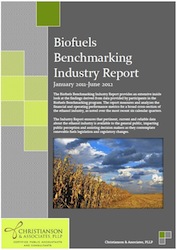According to a recent World Agricultural Supply and Demand Estimates (WASDE) report, global farmers will harvest the second largest corn crop on record in 2012. In response to the news, the Global Renewable Fuels Alliance (GRFA) criticized Organisation of Economic Co-operation and Development (OECD) Senior Counsellor, Carmel Cahill for making unsubstantiated comments blaming biofuel mandates for increasing the cost of food.
The WASDE report also concluded that despite wide spread drought, the U.S. will harvest its eighth largest crop in history. Output in several countries has increased including Argentinean production more than 30 percent over last year, Mexican  production increased 19 percent, South Africa 17 percent, Canada 9 percent, and China 4 percent. Global grain supply is also expected to be the second-largest in history, totaling 2.71 billion metric tons in 2012/2013 with the European Union grain crop to be about average.
production increased 19 percent, South Africa 17 percent, Canada 9 percent, and China 4 percent. Global grain supply is also expected to be the second-largest in history, totaling 2.71 billion metric tons in 2012/2013 with the European Union grain crop to be about average.
“It is irresponsible of policy-makers like Ms. Cahill to make these sweeping, unsubstantiated statements,” said Bliss Baker, spokesperson for GRFA. “A wealth of evidence clearly shows that in recent years farmers are producing record crops and that these types of comments are simply not backed up by any evidence whatsoever.”
GRFA cites several significant factors causing a rise in food prices including volatile oil prices, food waste, climate change, financial speculation in commodities markets, trade protection measures such as export bans, fluctuating currency exchange rates, and changing diets in Asia that has led to an increase in global meat demand and ultimately higher demand for animal feed.
Baker continued, “Instead of making ill-informed policy statements about biofuels we should applaud our farmers and their determination to continually produce record corn harvests. Evidence shows that biofuels production is actually beneficial to food production by producing valuable food co-products and providing much needed investment in the agricultural system.”
In other news, the International Energy Agency, that just happens to be an OECD agency, recently released their Technology Roadmap – Biofuels for Transport, that shows biofuels could make up 27 percent of the world’s transport fuels by 2050, eliminate 2.1 gigatonnes of CO2 emissions and not jeopardize food security. The same report also revealed that current global biofuels production utilizes only 2 percent of global arable land, not significant enough to have any impact on food prices.







![RFA Conference Logo[2]](http://energy.agwired.com/wp-content/uploads/sites/11/2012/09/RFA-Conference-Logo1.jpeg)

 The comment period on a waiver of the Renewable Fuel Standard (RFS) requested by several governors is underway and
The comment period on a waiver of the Renewable Fuel Standard (RFS) requested by several governors is underway and